专题3 代词 2025年中考英语总复习专题训练(安徽专版,含答案)
文档属性
| 名称 | 专题3 代词 2025年中考英语总复习专题训练(安徽专版,含答案) | 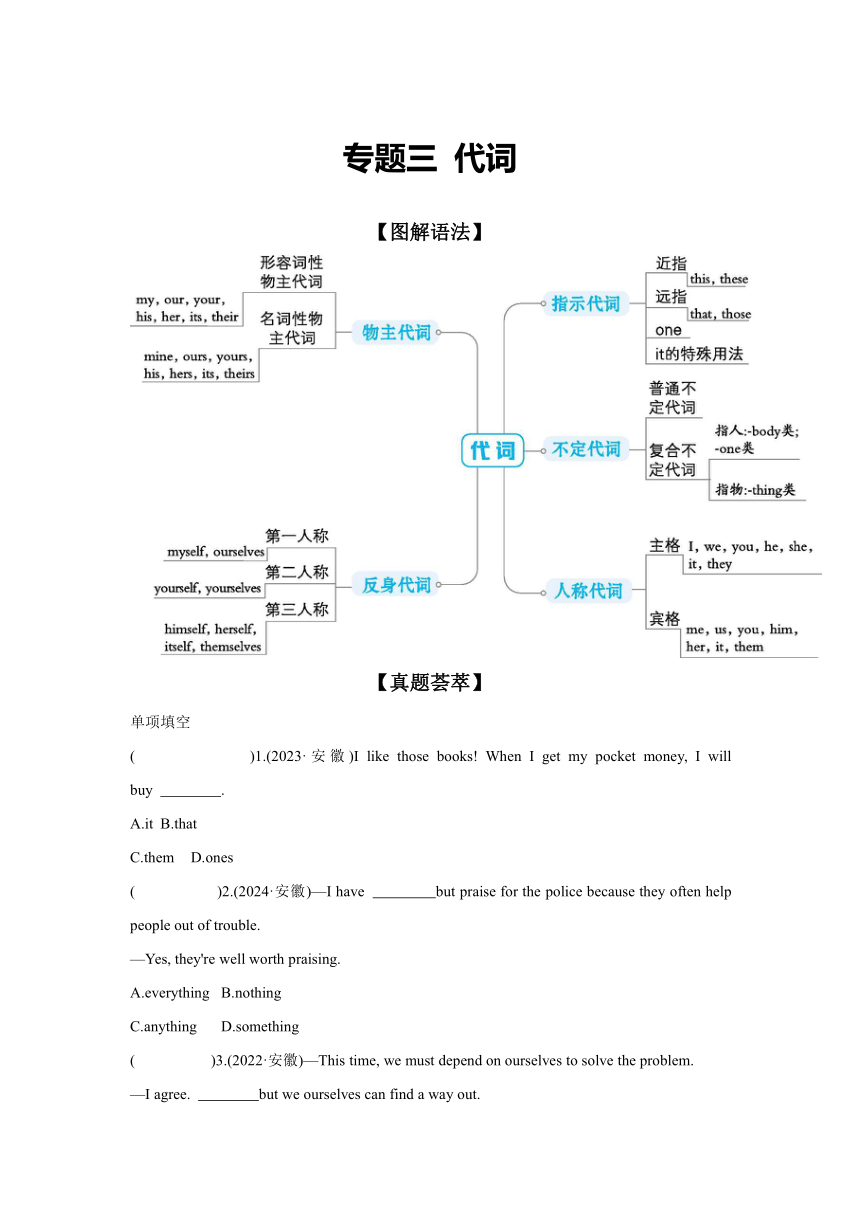 | |
| 格式 | docx | ||
| 文件大小 | 162.4KB | ||
| 资源类型 | 教案 | ||
| 版本资源 | 通用版 | ||
| 科目 | 英语 | ||
| 更新时间 | 2024-11-01 21:39:18 | ||
图片预览

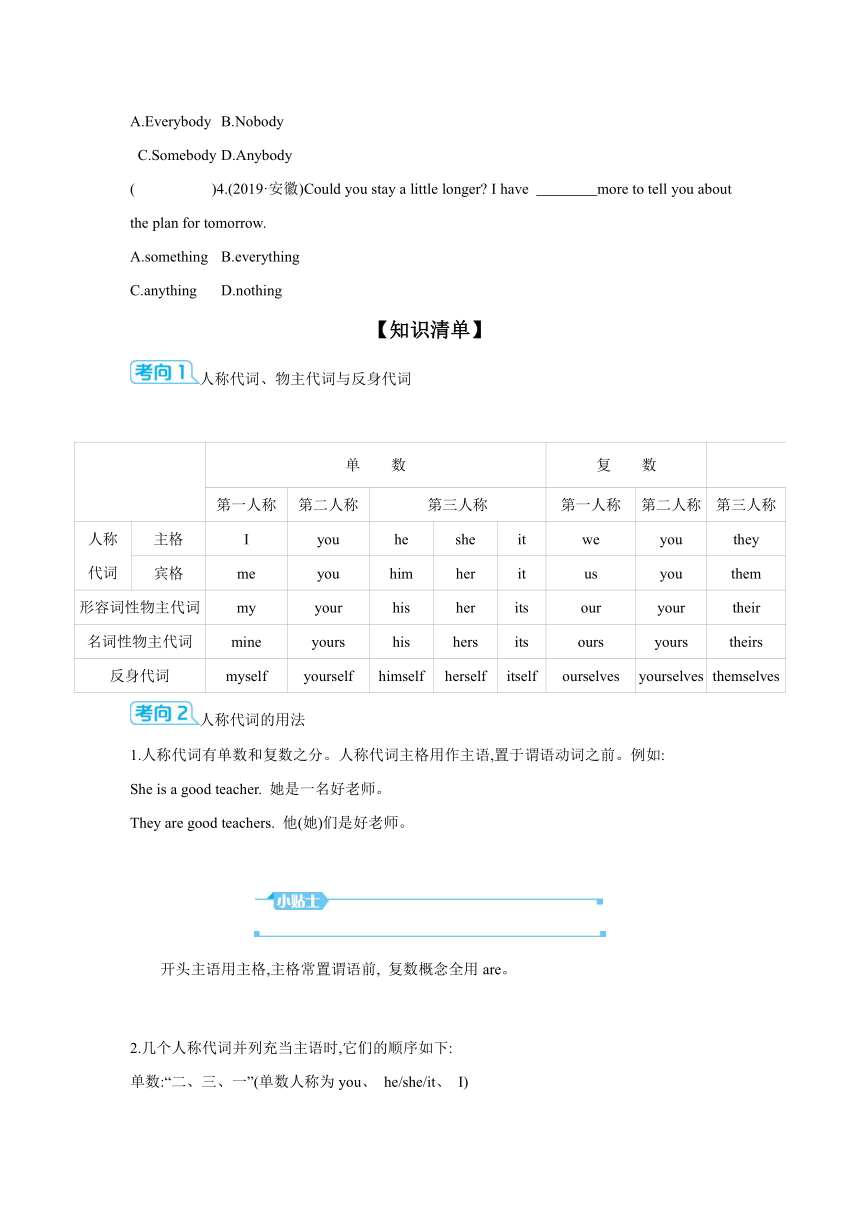
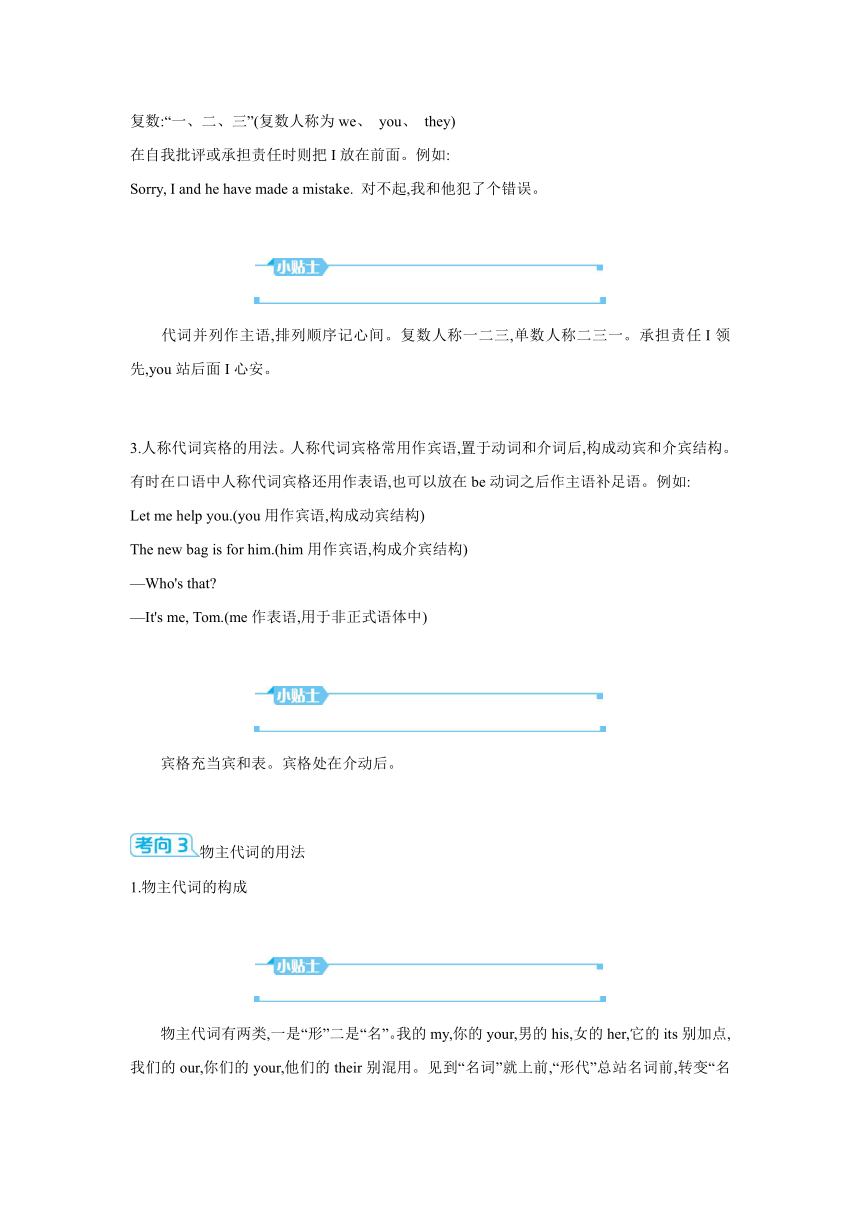
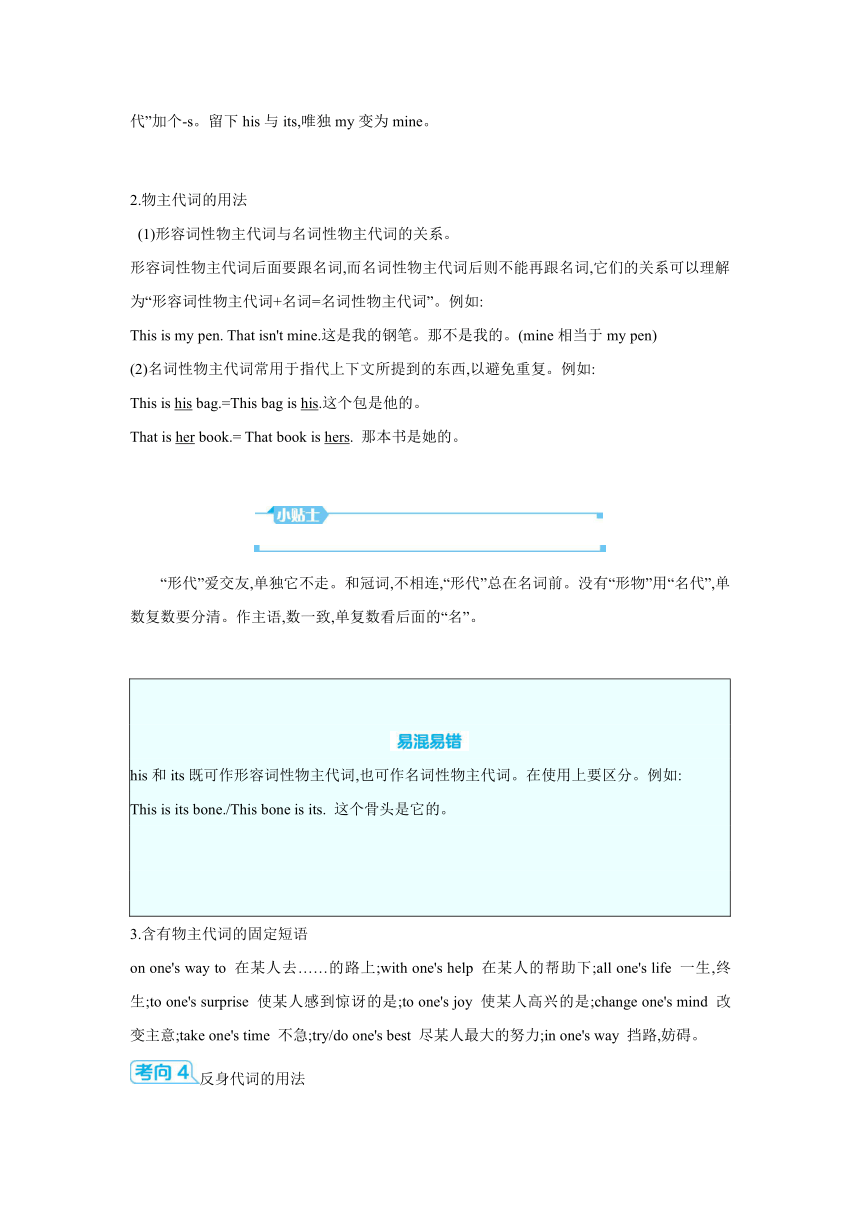
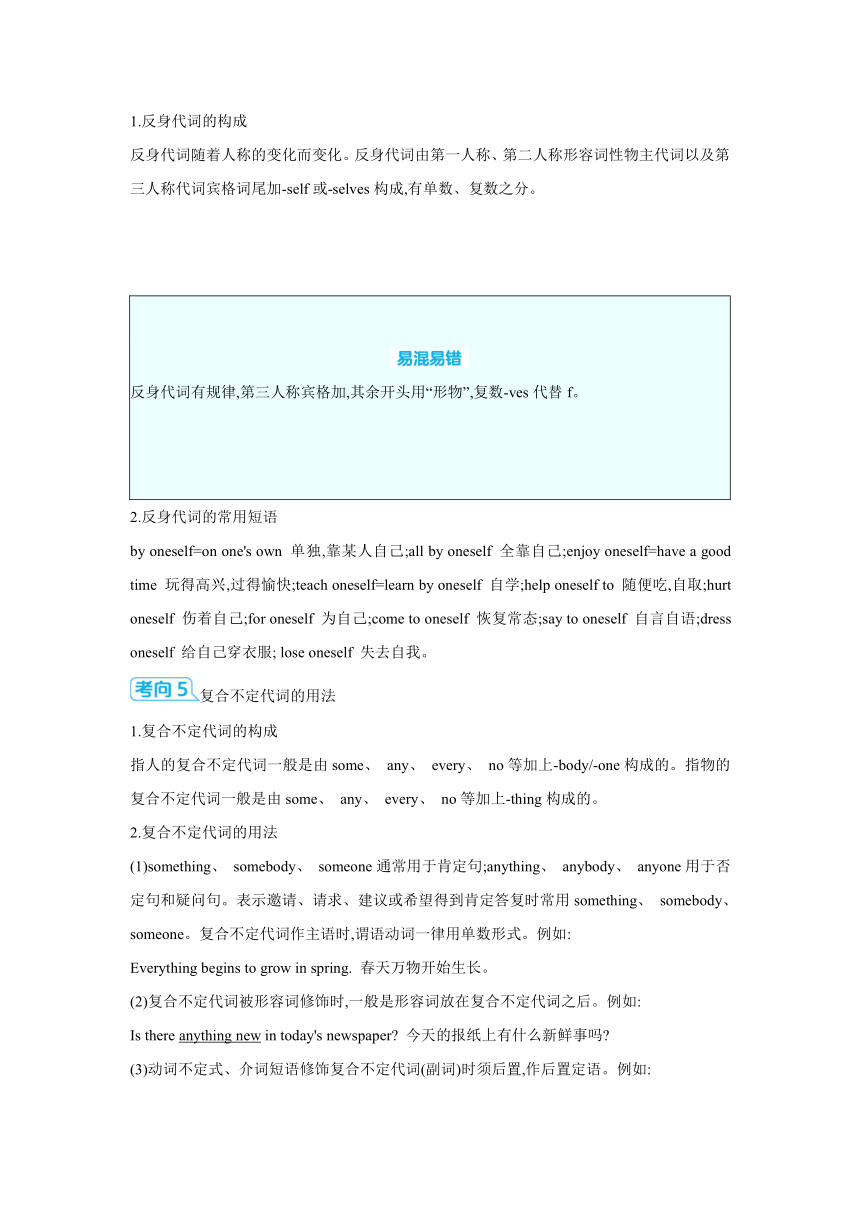
文档简介
专题三 代词
【图解语法】
【真题荟萃】
单项填空
( )1.(2023·安徽)I like those books! When I get my pocket money, I will buy .
A.it B.that
C.them D.ones
( )2.(2024·安徽)—I have but praise for the police because they often help people out of trouble.
—Yes, they're well worth praising.
A.everything B.nothing
C.anything D.something
( )3.(2022·安徽)—This time, we must depend on ourselves to solve the problem.
—I agree. but we ourselves can find a way out.
A.Everybody B.Nobody
C.Somebody D.Anybody
( )4.(2019·安徽)Could you stay a little longer I have more to tell you about the plan for tomorrow.
A.something B.everything
C.anything D.nothing
【知识清单】
人称代词、物主代词与反身代词
单 数 复 数
第一人称 第二人称 第三人称 第一人称 第二人称 第三人称
人称 代词 主格 I you he she it we you they
宾格 me you him her it us you them
形容词性物主代词 my your his her its our your their
名词性物主代词 mine yours his hers its ours yours theirs
反身代词 myself yourself himself herself itself ourselves yourselves themselves
人称代词的用法
1.人称代词有单数和复数之分。人称代词主格用作主语,置于谓语动词之前。例如:
She is a good teacher. 她是一名好老师。
They are good teachers. 他(她)们是好老师。
开头主语用主格,主格常置谓语前, 复数概念全用are。
2.几个人称代词并列充当主语时,它们的顺序如下:
单数:“二、三、一”(单数人称为you、 he/she/it、 I)
复数:“一、二、三”(复数人称为we、 you、 they)
在自我批评或承担责任时则把I放在前面。例如:
Sorry, I and he have made a mistake. 对不起,我和他犯了个错误。
代词并列作主语,排列顺序记心间。复数人称一二三,单数人称二三一。承担责任I领先,you站后面I心安。
3.人称代词宾格的用法。人称代词宾格常用作宾语,置于动词和介词后,构成动宾和介宾结构。有时在口语中人称代词宾格还用作表语,也可以放在be动词之后作主语补足语。例如:
Let me help you.(you用作宾语,构成动宾结构)
The new bag is for him.(him用作宾语,构成介宾结构)
—Who's that
—It's me, Tom.(me作表语,用于非正式语体中)
宾格充当宾和表。宾格处在介动后。
物主代词的用法
1.物主代词的构成
物主代词有两类,一是“形”二是“名”。我的my,你的your,男的his,女的her,它的its别加点,我们的our,你们的your,他们的their别混用。见到“名词”就上前,“形代”总站名词前,转变“名代”加个-s。留下his与its,唯独my变为mine。
2.物主代词的用法
(1)形容词性物主代词与名词性物主代词的关系。
形容词性物主代词后面要跟名词,而名词性物主代词后则不能再跟名词,它们的关系可以理解为“形容词性物主代词+名词=名词性物主代词”。例如:
This is my pen. That isn't mine.这是我的钢笔。那不是我的。(mine相当于my pen)
(2)名词性物主代词常用于指代上下文所提到的东西,以避免重复。例如:
This is his bag.=This bag is his.这个包是他的。
That is her book.= That book is hers. 那本书是她的。
“形代”爱交友,单独它不走。和冠词,不相连,“形代”总在名词前。没有“形物”用“名代”,单数复数要分清。作主语,数一致,单复数看后面的“名”。
his和its既可作形容词性物主代词,也可作名词性物主代词。在使用上要区分。例如:
This is its bone./This bone is its. 这个骨头是它的。
3.含有物主代词的固定短语
on one's way to 在某人去……的路上;with one's help 在某人的帮助下;all one's life 一生,终生;to one's surprise 使某人感到惊讶的是;to one's joy 使某人高兴的是;change one's mind 改变主意;take one's time 不急;try/do one's best 尽某人最大的努力;in one's way 挡路,妨碍。
反身代词的用法
1.反身代词的构成
反身代词随着人称的变化而变化。反身代词由第一人称、第二人称形容词性物主代词以及第三人称代词宾格词尾加-self或-selves构成,有单数、复数之分。
反身代词有规律,第三人称宾格加,其余开头用“形物”,复数-ves代替f。
2.反身代词的常用短语
by oneself=on one's own 单独,靠某人自己;all by oneself 全靠自己;enjoy oneself=have a good time 玩得高兴,过得愉快;teach oneself=learn by oneself 自学;help oneself to 随便吃,自取;hurt oneself 伤着自己;for oneself 为自己;come to oneself 恢复常态;say to oneself 自言自语;dress oneself 给自己穿衣服; lose oneself 失去自我。
复合不定代词的用法
1.复合不定代词的构成
指人的复合不定代词一般是由some、 any、 every、 no等加上-body/-one构成的。指物的复合不定代词一般是由some、 any、 every、 no等加上-thing构成的。
2.复合不定代词的用法
(1)something、 somebody、 someone通常用于肯定句;anything、 anybody、 anyone用于否定句和疑问句。表示邀请、请求、建议或希望得到肯定答复时常用something、 somebody、 someone。复合不定代词作主语时,谓语动词一律用单数形式。例如:
Everything begins to grow in spring. 春天万物开始生长。
(2)复合不定代词被形容词修饰时,一般是形容词放在复合不定代词之后。例如:
Is there anything new in today's newspaper 今天的报纸上有什么新鲜事吗
(3)动词不定式、介词短语修饰复合不定代词(副词)时须后置,作后置定语。例如:
Could you give me something to eat 你能给我一些吃的吗
(4)复合不定代词与else 一词相连时,应注意else 必须置于复合不定代词之后。例如:
There is nothing else in the bag. 包里没有别的东西了。
3.复合不定代词的转换
(1)anything一般用于否定句和疑问句;not...anything相当于nothing;nothing是否定词,不与否定词not连用。
(2)anybody一般用于否定句和疑问句,not...anybody相当于nobody。例如:
There isn't anybody in the room./There is nobody in the room.房间里没有人。
everyone不可写成every one。everyone一般用来指人,相当于everybody,意为“人人,每人”。every one意为“每个”。everyone后面不能跟of短语,而every one后面可跟of短语,此时的every one既可指人也可指物。
普通不定代词的用法
1.other, the other, others, the others, another
意义 习惯搭配 备注
other “另外的,其他的”,泛指“另一些人或物” other+复数名词=others 常起形容词作用,多修饰复数名词
the other 表示两个人或物中的另一个或另一部分,特指“两者中的另一个”;若把三者或三者以上的人或物分成两部分来叙述,则指“另外几个(或一些)” one...the other..., the other+名词
others 泛指“另一些(不是其余全部)” some...others 只能作代词,该词不能指“其余全部的人或物”
the others 特指范围内的“其余的人或物”或已知的人或物中“(除……之外)其余的全部” some...the others
another 表示三个或更多的人或物中同类的另一个;特指多数中还没提及的“另一个”“再一个” one...another 该词还可表示“又;再”,放于数字前,如:another two weeks
2.it, one
it 可以代替上文出现过的名词,但it通常代替上文所提事物本身,有特指作用,即同类同物。it既可代替可数名词单数,也可代替不可数名词
one 指代上文中出现的可数名词单数形式,使句子更简洁。one指代的名词与上文中出现的名词不是同一事物,而是同类事物中的另外一个,即同类异物
例如:
My brother has a nice bag. I want to use it. 我哥哥(弟弟)有一个漂亮的书包。我想用一下。(同类事物,且指同一个书包)
My brother has a nice bag. I want to buy one. 我哥哥(弟弟)有一个漂亮的书包。我想去买一个。(同类事物,但不是指同一个书包)
3.no one, none
no one= nobody 意为“没有人”,只指人,不指代物。一般不和of相连。当no one作主语时,谓语动词用单数形式
none 意为“一个人也没有”,既可用来代替人,表示“(三个以上)一个也没有”,也可用来代替物(可数与不可数皆可),表示“没有任何东西”
指“(三个或三个以上的人或物中)没有一个人或物”,常与of连用,表示全部否定。作主语时,谓语动词既可用单数,也可用复数
例如:
No one is perfect. 人无完人。
None of the stories are (is) interesting. 没有一个故事有意思。
用who、 what提问的句子用no one/nobody或nothing来回答。在简略回答中,none用来回答“How many... ”/“How much... ” 的疑问句。
4.little, a little, few, a few
little 很少的;几乎没有 表示否定,修饰不可数名词。比较级为less,最高级为least,反义词是much (more, most) 例如:There is little milk in the glass. 玻璃杯里几乎没有牛奶了。
a little 一些,一点,少量 表示肯定,修饰不可数名词 例如:There is a little water in my bottle. I can give you some. 我的水瓶里有一些水,我可以给你一些。
few 少数的;几乎没有 表示否定,修饰可数名词的复数。比较级是fewer,最高级为fewest,反义词是many (more, most) 例如:Lily has few apples. Lily几乎没有苹果。
a few 一些,几个 表示肯定,修饰可数名词的复数 例如:I'm going to buy a few bananas. 我打算去买一些香蕉。
5.every, each
every 强调整体,用于三者或三者以上的人或事物中的“每一个”,只能作定语。还可与not连用构成部分否定
each 强调个人,用于两者或两者以上,在句中可作主语、宾语、定语、同位语等,后面可以跟表示范围的of...结构。不可以与not连用
例如:
Every boy in the room knows it. 房间里的每个男孩都知道它。
Each of them has read this book. 他们中的每个人都读过这本书。
指示代词的用法
指示代词 近指 远指 单数 复数
this √ √
that √ √
指示代词 近指 远指 单数 复数
these √ √
those √ √
指示代词四兄弟,近指远指有规律。this、 that是单数,these、 those是复数;this、 these表“近处”,that、 those表“远处”。
1.在回答this或that (指物时)为主语的疑问句时,用it代替this或that。that is可以缩写成that's,而this is却不能缩写为this's。在回答主语是these或those的一般疑问句或特殊疑问句时,通常用they来代替问句中的these或those,以避免重复。例如:
—Are those her books 那些是她的书吗
—Yes, they are./No, they aren't. 是的,它们是。/不,它们不是。
2.在电话用语中,用this指代自己,that指代对方。例如:
—Hello! This is Li Ping. Who's that 你好,我是李平。你是哪位
—Hey, Li Ping. This is Wang Hai. 嘿,李平。我是王海。
疑问代词的用法
疑问代词 意义 基本用法 例句
who 谁 who是主格,询问人的身份或对句子中的人进行提问,在句子中充当主语或表语的角色。who与is相连可缩写成who's (谁是),与whose同音 —Who is not here (who作主语) —Han Meimei isn't here. —Who's that (who作表语) —That's Lucy.
whom 谁 whom是宾格,用作宾语,在口语中,也可用who作宾语,但是在介词的后面只能用whom Whom did you go to the park with 你和谁一起去的公园
whose 谁的 whose既可作形容词性物主代词,也可作名词性物主代词,注意不要与who's混淆 Whose bike is this 这是谁的自行车
what 什么 指物,对句子中的事物或一些名词进行提问 What color bike do you have 你有什么颜色的自行车
which 哪个 用于对“定语”进行提问,通常用于在一个确定的、有限的范围内做出选择 —Which bike is yours, the black one or the blue one 哪辆自行车是你的,黑色的还是蓝色的 —The black one. 黑色的。
拓展
1.疑问代词一般可用作连接代词,引导宾语从句。例如:
Do you know which is right 你知道哪个是对的吗
I'm not sure who will come tonight. 我不确定今晚谁会来。
2.除what以外的疑问代词一般可用作关系代词,引导定语从句。例如:
He is the teacher who you want to see. 他就是你想见的那位老师。
it用作形式主语的用法
(1)It's time for sb. to do sth./ It's time for sth.;(2)It takes sb.some time to do sth.;(3)It costs sb. some money to do sth.;(4)It seems that...;(5)It is one's turn to do sth.;(6)It is/has been +时间段+since+一般过去时;(7)It's said/reported that...;(8)It's+名词/形容词+that从句;(9)It's+名词/形容词+(for/of sb.)+不定式;(10)It looks (seems) as if...
【仿真作业】
【基础作业】
Ⅰ.单项填空
( )1.(2024·甘肃临夏)The town is getting more and more beautiful with many flowers on sides of the streets.
A.all B.either
C.neither D.both
( )2.(2024·广西改编)—Andy, who are the girls over there
— are my sisters, Lily and Lucy.
A.They B.We
C.You D.He
( )3.(2024·甘肃白银)Mark just phoned to say he'd left his coat behind. Do you know if this is
A.mine B.hers
C.his D.its
( )4.(2024·黑龙江龙东改编)He found very interesting to visit Harbin in winter.
A.this B.that
C.it D.one
( )5.(2024·吉林改编)Running is getting popular. It is good for our health and it costs .
A.nothing B.everything
C.anything D.something
( )6.(2024·吉林长春)As a science lover, I hope I can invent a bike can fly in the sky.
A.where B.when
C.which D.who
( )7.(2024·黑龙江绥化改编)The light went out suddenly. It was very dark and could be seen clearly.
A.anything B.something
C.nothing D.everything
( )8.(2024·江苏扬州)“What's that ” is of the first things that children say.
A.some B.each
C.one D.that
( )9.(2024·山东滨州) —I heard that people in Paris stood in a long line to buy Chinese xiaolongbao.
—Yes, could say no to it there.
A.everybody B.nobody
C.somebody D.anybody
( )10.(2024·四川成都改编)Miss Lin teaches piano very well. With help, I've made great progress.
A.his B.her
C.their D.its
Ⅱ.单词拼写
1.(2024·甘肃临夏改编)Tina had to look after h (她的) younger sister at home last weekend.
2.(2024·甘肃白银改编)The cat lay on the sofa, washing i (它自己).
3.(2024·黑龙江龙东改编)We enjoyed o (我们自己) at Zhaolin Park last Sunday.
4.(2024·四川凉山改编)The old man lives by h (他自己), but he doesn't feel lonely.
5.(2024·四川达州改编)There is something wrong with my computer. Could I use y (你的)
【提高作业】
单项填空
( )1.(2024·芜湖二模)—How often do you exercise, Tom
—Every day. I believe that health is .
A.everything B.anything
C.something D.nothing
( )2.(2024·蚌埠二模)The student tried quite a few ways to work out the chemistry problem, but of them worked.
A.all B.both
C.none D.neither
( )3.(2024·合肥庐江二模)Listening and speaking are basic skills.You need to communicate with others.
A.it B.that
C.ones D.them
( )4.(2024·滁州全椒一模)—A strong mind needs a strong body.
—I think so. of them are important to us students.
A.Both B.Either
C.Neither D.All
( )5.(2024·合肥三模)—Which film do you prefer, Article 20 or YOLO
— . I like Kung Fu Panda 4 better.
A.Both B.Neither
C.All D.None
( )6.(2024·合肥蜀山区一模)—Mount Huangshan and Mount Jiuhuashan are well-known to millions of people.
—Yes. As people in Anhui, we take pride in of them.
A.both B.all
C.neither D.any
( )7.(2024·六安霍邱二模)—Dad, can you tell me how to be a smart learner
—Only empty cups can be filled with the most water, so remember to learn just like you know .
A.nothing B.something
C.anything D.everything
( )8.(2024·安庆二模)—What do you think of the weather in winter in our city Hefei
—Not so cold. I think it is much warmer than in Beijing.
A.it B.this
C.that D.one
【素养作业】
单项填空
( )1.—Did anyone call me when I was out
—Yes. A man who called Tom.
A.myself B.himself
C.herself D.yourself
( )2.We've got two TV sets, but works well.
A.any B.both
C.either D.neither
( )3.—Are these crayons yours, Alice
—No, they are for .
A.hers B.their
C.them D.he
( )4.This project requires close teamwork. will be achieved unless we work well together.
A.Something B.Anything
C.Nothing D.Everything
( )5.—Why don't you take a trip to the USA
—Because of us can speak English. It is very difficult to communicate.
A.everybody B.none
C.somebody D.anybody
( )6.This isn't my wallet. I left at home.
A.mine B.my
C.me D.myself
( )7.—This book on Hefei's history is interesting. Where did you buy it, Eric I'd like .
—In Amazon Bookstore.
A.it B.this
C.that D.one
( )8. went hiking last weekend because of the bad weather.
A.Someone B.No one
C.Everyone D.Nothing
( )9.—If you want to change for a double room, you'll have to pay 120 dollars.
—All right.
A.another B.more
C.other D.each
( )10.—I tried several jackets on, but of them looked good on me.
—No worries. We've got some new ones in the next room.
A.all B.each
C.none D.neither
【参考答案】
专题三 代词
真题精粹
1.D 【思路点拨】考查代词辨析。句意:我喜欢那些书!当我有零花钱的时候,我就会买一些。it“它”;that“那个”;them“它们”;ones“一些”。此空与前文提到的books属于同类不同物,且books是复数形式,应填ones。
2.B 【思路点拨】考查复合不定代词的用法。句意:——我对这些警察除了赞扬没有其他要说的了,因为他们常常帮助人们解决困难。——是的,他们相当值得表扬。nothing but意为“除了……之外没有其他的”。
3.B 【思路点拨】考查复合不定代词的用法。句意:——这次我们必须依靠我们自己解决这个问题。——我同意。除了我们自己没有人能找到办法。everybody“每个人”;nobody“没有人”;somebody“某人”;anybody“任何人”。
4.A 【思路点拨】考查复合不定代词的用法。句意:你能多待一会儿吗 关于明天的计划,我还有一些事情要告诉你。something“一些事情”,常用于肯定句中;everything“一切,每件事情”;anything“一些事情,任何事情”,通常用于否定句或疑问句中;nothing“没有什么”。本空所在句为肯定句,排除C。根据句意可知选A。
仿真作业
基础作业
Ⅰ.1~5 DACCA 6~10 CCCBB
Ⅱ.1.her 2.itself 3.ourselves 4.himself 5.yours
提升作业
1~5 ACDAB 6~8 AAC
素养作业
1~5 BDCCB 6~10 ADBAC
【图解语法】
【真题荟萃】
单项填空
( )1.(2023·安徽)I like those books! When I get my pocket money, I will buy .
A.it B.that
C.them D.ones
( )2.(2024·安徽)—I have but praise for the police because they often help people out of trouble.
—Yes, they're well worth praising.
A.everything B.nothing
C.anything D.something
( )3.(2022·安徽)—This time, we must depend on ourselves to solve the problem.
—I agree. but we ourselves can find a way out.
A.Everybody B.Nobody
C.Somebody D.Anybody
( )4.(2019·安徽)Could you stay a little longer I have more to tell you about the plan for tomorrow.
A.something B.everything
C.anything D.nothing
【知识清单】
人称代词、物主代词与反身代词
单 数 复 数
第一人称 第二人称 第三人称 第一人称 第二人称 第三人称
人称 代词 主格 I you he she it we you they
宾格 me you him her it us you them
形容词性物主代词 my your his her its our your their
名词性物主代词 mine yours his hers its ours yours theirs
反身代词 myself yourself himself herself itself ourselves yourselves themselves
人称代词的用法
1.人称代词有单数和复数之分。人称代词主格用作主语,置于谓语动词之前。例如:
She is a good teacher. 她是一名好老师。
They are good teachers. 他(她)们是好老师。
开头主语用主格,主格常置谓语前, 复数概念全用are。
2.几个人称代词并列充当主语时,它们的顺序如下:
单数:“二、三、一”(单数人称为you、 he/she/it、 I)
复数:“一、二、三”(复数人称为we、 you、 they)
在自我批评或承担责任时则把I放在前面。例如:
Sorry, I and he have made a mistake. 对不起,我和他犯了个错误。
代词并列作主语,排列顺序记心间。复数人称一二三,单数人称二三一。承担责任I领先,you站后面I心安。
3.人称代词宾格的用法。人称代词宾格常用作宾语,置于动词和介词后,构成动宾和介宾结构。有时在口语中人称代词宾格还用作表语,也可以放在be动词之后作主语补足语。例如:
Let me help you.(you用作宾语,构成动宾结构)
The new bag is for him.(him用作宾语,构成介宾结构)
—Who's that
—It's me, Tom.(me作表语,用于非正式语体中)
宾格充当宾和表。宾格处在介动后。
物主代词的用法
1.物主代词的构成
物主代词有两类,一是“形”二是“名”。我的my,你的your,男的his,女的her,它的its别加点,我们的our,你们的your,他们的their别混用。见到“名词”就上前,“形代”总站名词前,转变“名代”加个-s。留下his与its,唯独my变为mine。
2.物主代词的用法
(1)形容词性物主代词与名词性物主代词的关系。
形容词性物主代词后面要跟名词,而名词性物主代词后则不能再跟名词,它们的关系可以理解为“形容词性物主代词+名词=名词性物主代词”。例如:
This is my pen. That isn't mine.这是我的钢笔。那不是我的。(mine相当于my pen)
(2)名词性物主代词常用于指代上下文所提到的东西,以避免重复。例如:
This is his bag.=This bag is his.这个包是他的。
That is her book.= That book is hers. 那本书是她的。
“形代”爱交友,单独它不走。和冠词,不相连,“形代”总在名词前。没有“形物”用“名代”,单数复数要分清。作主语,数一致,单复数看后面的“名”。
his和its既可作形容词性物主代词,也可作名词性物主代词。在使用上要区分。例如:
This is its bone./This bone is its. 这个骨头是它的。
3.含有物主代词的固定短语
on one's way to 在某人去……的路上;with one's help 在某人的帮助下;all one's life 一生,终生;to one's surprise 使某人感到惊讶的是;to one's joy 使某人高兴的是;change one's mind 改变主意;take one's time 不急;try/do one's best 尽某人最大的努力;in one's way 挡路,妨碍。
反身代词的用法
1.反身代词的构成
反身代词随着人称的变化而变化。反身代词由第一人称、第二人称形容词性物主代词以及第三人称代词宾格词尾加-self或-selves构成,有单数、复数之分。
反身代词有规律,第三人称宾格加,其余开头用“形物”,复数-ves代替f。
2.反身代词的常用短语
by oneself=on one's own 单独,靠某人自己;all by oneself 全靠自己;enjoy oneself=have a good time 玩得高兴,过得愉快;teach oneself=learn by oneself 自学;help oneself to 随便吃,自取;hurt oneself 伤着自己;for oneself 为自己;come to oneself 恢复常态;say to oneself 自言自语;dress oneself 给自己穿衣服; lose oneself 失去自我。
复合不定代词的用法
1.复合不定代词的构成
指人的复合不定代词一般是由some、 any、 every、 no等加上-body/-one构成的。指物的复合不定代词一般是由some、 any、 every、 no等加上-thing构成的。
2.复合不定代词的用法
(1)something、 somebody、 someone通常用于肯定句;anything、 anybody、 anyone用于否定句和疑问句。表示邀请、请求、建议或希望得到肯定答复时常用something、 somebody、 someone。复合不定代词作主语时,谓语动词一律用单数形式。例如:
Everything begins to grow in spring. 春天万物开始生长。
(2)复合不定代词被形容词修饰时,一般是形容词放在复合不定代词之后。例如:
Is there anything new in today's newspaper 今天的报纸上有什么新鲜事吗
(3)动词不定式、介词短语修饰复合不定代词(副词)时须后置,作后置定语。例如:
Could you give me something to eat 你能给我一些吃的吗
(4)复合不定代词与else 一词相连时,应注意else 必须置于复合不定代词之后。例如:
There is nothing else in the bag. 包里没有别的东西了。
3.复合不定代词的转换
(1)anything一般用于否定句和疑问句;not...anything相当于nothing;nothing是否定词,不与否定词not连用。
(2)anybody一般用于否定句和疑问句,not...anybody相当于nobody。例如:
There isn't anybody in the room./There is nobody in the room.房间里没有人。
everyone不可写成every one。everyone一般用来指人,相当于everybody,意为“人人,每人”。every one意为“每个”。everyone后面不能跟of短语,而every one后面可跟of短语,此时的every one既可指人也可指物。
普通不定代词的用法
1.other, the other, others, the others, another
意义 习惯搭配 备注
other “另外的,其他的”,泛指“另一些人或物” other+复数名词=others 常起形容词作用,多修饰复数名词
the other 表示两个人或物中的另一个或另一部分,特指“两者中的另一个”;若把三者或三者以上的人或物分成两部分来叙述,则指“另外几个(或一些)” one...the other..., the other+名词
others 泛指“另一些(不是其余全部)” some...others 只能作代词,该词不能指“其余全部的人或物”
the others 特指范围内的“其余的人或物”或已知的人或物中“(除……之外)其余的全部” some...the others
another 表示三个或更多的人或物中同类的另一个;特指多数中还没提及的“另一个”“再一个” one...another 该词还可表示“又;再”,放于数字前,如:another two weeks
2.it, one
it 可以代替上文出现过的名词,但it通常代替上文所提事物本身,有特指作用,即同类同物。it既可代替可数名词单数,也可代替不可数名词
one 指代上文中出现的可数名词单数形式,使句子更简洁。one指代的名词与上文中出现的名词不是同一事物,而是同类事物中的另外一个,即同类异物
例如:
My brother has a nice bag. I want to use it. 我哥哥(弟弟)有一个漂亮的书包。我想用一下。(同类事物,且指同一个书包)
My brother has a nice bag. I want to buy one. 我哥哥(弟弟)有一个漂亮的书包。我想去买一个。(同类事物,但不是指同一个书包)
3.no one, none
no one= nobody 意为“没有人”,只指人,不指代物。一般不和of相连。当no one作主语时,谓语动词用单数形式
none 意为“一个人也没有”,既可用来代替人,表示“(三个以上)一个也没有”,也可用来代替物(可数与不可数皆可),表示“没有任何东西”
指“(三个或三个以上的人或物中)没有一个人或物”,常与of连用,表示全部否定。作主语时,谓语动词既可用单数,也可用复数
例如:
No one is perfect. 人无完人。
None of the stories are (is) interesting. 没有一个故事有意思。
用who、 what提问的句子用no one/nobody或nothing来回答。在简略回答中,none用来回答“How many... ”/“How much... ” 的疑问句。
4.little, a little, few, a few
little 很少的;几乎没有 表示否定,修饰不可数名词。比较级为less,最高级为least,反义词是much (more, most) 例如:There is little milk in the glass. 玻璃杯里几乎没有牛奶了。
a little 一些,一点,少量 表示肯定,修饰不可数名词 例如:There is a little water in my bottle. I can give you some. 我的水瓶里有一些水,我可以给你一些。
few 少数的;几乎没有 表示否定,修饰可数名词的复数。比较级是fewer,最高级为fewest,反义词是many (more, most) 例如:Lily has few apples. Lily几乎没有苹果。
a few 一些,几个 表示肯定,修饰可数名词的复数 例如:I'm going to buy a few bananas. 我打算去买一些香蕉。
5.every, each
every 强调整体,用于三者或三者以上的人或事物中的“每一个”,只能作定语。还可与not连用构成部分否定
each 强调个人,用于两者或两者以上,在句中可作主语、宾语、定语、同位语等,后面可以跟表示范围的of...结构。不可以与not连用
例如:
Every boy in the room knows it. 房间里的每个男孩都知道它。
Each of them has read this book. 他们中的每个人都读过这本书。
指示代词的用法
指示代词 近指 远指 单数 复数
this √ √
that √ √
指示代词 近指 远指 单数 复数
these √ √
those √ √
指示代词四兄弟,近指远指有规律。this、 that是单数,these、 those是复数;this、 these表“近处”,that、 those表“远处”。
1.在回答this或that (指物时)为主语的疑问句时,用it代替this或that。that is可以缩写成that's,而this is却不能缩写为this's。在回答主语是these或those的一般疑问句或特殊疑问句时,通常用they来代替问句中的these或those,以避免重复。例如:
—Are those her books 那些是她的书吗
—Yes, they are./No, they aren't. 是的,它们是。/不,它们不是。
2.在电话用语中,用this指代自己,that指代对方。例如:
—Hello! This is Li Ping. Who's that 你好,我是李平。你是哪位
—Hey, Li Ping. This is Wang Hai. 嘿,李平。我是王海。
疑问代词的用法
疑问代词 意义 基本用法 例句
who 谁 who是主格,询问人的身份或对句子中的人进行提问,在句子中充当主语或表语的角色。who与is相连可缩写成who's (谁是),与whose同音 —Who is not here (who作主语) —Han Meimei isn't here. —Who's that (who作表语) —That's Lucy.
whom 谁 whom是宾格,用作宾语,在口语中,也可用who作宾语,但是在介词的后面只能用whom Whom did you go to the park with 你和谁一起去的公园
whose 谁的 whose既可作形容词性物主代词,也可作名词性物主代词,注意不要与who's混淆 Whose bike is this 这是谁的自行车
what 什么 指物,对句子中的事物或一些名词进行提问 What color bike do you have 你有什么颜色的自行车
which 哪个 用于对“定语”进行提问,通常用于在一个确定的、有限的范围内做出选择 —Which bike is yours, the black one or the blue one 哪辆自行车是你的,黑色的还是蓝色的 —The black one. 黑色的。
拓展
1.疑问代词一般可用作连接代词,引导宾语从句。例如:
Do you know which is right 你知道哪个是对的吗
I'm not sure who will come tonight. 我不确定今晚谁会来。
2.除what以外的疑问代词一般可用作关系代词,引导定语从句。例如:
He is the teacher who you want to see. 他就是你想见的那位老师。
it用作形式主语的用法
(1)It's time for sb. to do sth./ It's time for sth.;(2)It takes sb.some time to do sth.;(3)It costs sb. some money to do sth.;(4)It seems that...;(5)It is one's turn to do sth.;(6)It is/has been +时间段+since+一般过去时;(7)It's said/reported that...;(8)It's+名词/形容词+that从句;(9)It's+名词/形容词+(for/of sb.)+不定式;(10)It looks (seems) as if...
【仿真作业】
【基础作业】
Ⅰ.单项填空
( )1.(2024·甘肃临夏)The town is getting more and more beautiful with many flowers on sides of the streets.
A.all B.either
C.neither D.both
( )2.(2024·广西改编)—Andy, who are the girls over there
— are my sisters, Lily and Lucy.
A.They B.We
C.You D.He
( )3.(2024·甘肃白银)Mark just phoned to say he'd left his coat behind. Do you know if this is
A.mine B.hers
C.his D.its
( )4.(2024·黑龙江龙东改编)He found very interesting to visit Harbin in winter.
A.this B.that
C.it D.one
( )5.(2024·吉林改编)Running is getting popular. It is good for our health and it costs .
A.nothing B.everything
C.anything D.something
( )6.(2024·吉林长春)As a science lover, I hope I can invent a bike can fly in the sky.
A.where B.when
C.which D.who
( )7.(2024·黑龙江绥化改编)The light went out suddenly. It was very dark and could be seen clearly.
A.anything B.something
C.nothing D.everything
( )8.(2024·江苏扬州)“What's that ” is of the first things that children say.
A.some B.each
C.one D.that
( )9.(2024·山东滨州) —I heard that people in Paris stood in a long line to buy Chinese xiaolongbao.
—Yes, could say no to it there.
A.everybody B.nobody
C.somebody D.anybody
( )10.(2024·四川成都改编)Miss Lin teaches piano very well. With help, I've made great progress.
A.his B.her
C.their D.its
Ⅱ.单词拼写
1.(2024·甘肃临夏改编)Tina had to look after h (她的) younger sister at home last weekend.
2.(2024·甘肃白银改编)The cat lay on the sofa, washing i (它自己).
3.(2024·黑龙江龙东改编)We enjoyed o (我们自己) at Zhaolin Park last Sunday.
4.(2024·四川凉山改编)The old man lives by h (他自己), but he doesn't feel lonely.
5.(2024·四川达州改编)There is something wrong with my computer. Could I use y (你的)
【提高作业】
单项填空
( )1.(2024·芜湖二模)—How often do you exercise, Tom
—Every day. I believe that health is .
A.everything B.anything
C.something D.nothing
( )2.(2024·蚌埠二模)The student tried quite a few ways to work out the chemistry problem, but of them worked.
A.all B.both
C.none D.neither
( )3.(2024·合肥庐江二模)Listening and speaking are basic skills.You need to communicate with others.
A.it B.that
C.ones D.them
( )4.(2024·滁州全椒一模)—A strong mind needs a strong body.
—I think so. of them are important to us students.
A.Both B.Either
C.Neither D.All
( )5.(2024·合肥三模)—Which film do you prefer, Article 20 or YOLO
— . I like Kung Fu Panda 4 better.
A.Both B.Neither
C.All D.None
( )6.(2024·合肥蜀山区一模)—Mount Huangshan and Mount Jiuhuashan are well-known to millions of people.
—Yes. As people in Anhui, we take pride in of them.
A.both B.all
C.neither D.any
( )7.(2024·六安霍邱二模)—Dad, can you tell me how to be a smart learner
—Only empty cups can be filled with the most water, so remember to learn just like you know .
A.nothing B.something
C.anything D.everything
( )8.(2024·安庆二模)—What do you think of the weather in winter in our city Hefei
—Not so cold. I think it is much warmer than in Beijing.
A.it B.this
C.that D.one
【素养作业】
单项填空
( )1.—Did anyone call me when I was out
—Yes. A man who called Tom.
A.myself B.himself
C.herself D.yourself
( )2.We've got two TV sets, but works well.
A.any B.both
C.either D.neither
( )3.—Are these crayons yours, Alice
—No, they are for .
A.hers B.their
C.them D.he
( )4.This project requires close teamwork. will be achieved unless we work well together.
A.Something B.Anything
C.Nothing D.Everything
( )5.—Why don't you take a trip to the USA
—Because of us can speak English. It is very difficult to communicate.
A.everybody B.none
C.somebody D.anybody
( )6.This isn't my wallet. I left at home.
A.mine B.my
C.me D.myself
( )7.—This book on Hefei's history is interesting. Where did you buy it, Eric I'd like .
—In Amazon Bookstore.
A.it B.this
C.that D.one
( )8. went hiking last weekend because of the bad weather.
A.Someone B.No one
C.Everyone D.Nothing
( )9.—If you want to change for a double room, you'll have to pay 120 dollars.
—All right.
A.another B.more
C.other D.each
( )10.—I tried several jackets on, but of them looked good on me.
—No worries. We've got some new ones in the next room.
A.all B.each
C.none D.neither
【参考答案】
专题三 代词
真题精粹
1.D 【思路点拨】考查代词辨析。句意:我喜欢那些书!当我有零花钱的时候,我就会买一些。it“它”;that“那个”;them“它们”;ones“一些”。此空与前文提到的books属于同类不同物,且books是复数形式,应填ones。
2.B 【思路点拨】考查复合不定代词的用法。句意:——我对这些警察除了赞扬没有其他要说的了,因为他们常常帮助人们解决困难。——是的,他们相当值得表扬。nothing but意为“除了……之外没有其他的”。
3.B 【思路点拨】考查复合不定代词的用法。句意:——这次我们必须依靠我们自己解决这个问题。——我同意。除了我们自己没有人能找到办法。everybody“每个人”;nobody“没有人”;somebody“某人”;anybody“任何人”。
4.A 【思路点拨】考查复合不定代词的用法。句意:你能多待一会儿吗 关于明天的计划,我还有一些事情要告诉你。something“一些事情”,常用于肯定句中;everything“一切,每件事情”;anything“一些事情,任何事情”,通常用于否定句或疑问句中;nothing“没有什么”。本空所在句为肯定句,排除C。根据句意可知选A。
仿真作业
基础作业
Ⅰ.1~5 DACCA 6~10 CCCBB
Ⅱ.1.her 2.itself 3.ourselves 4.himself 5.yours
提升作业
1~5 ACDAB 6~8 AAC
素养作业
1~5 BDCCB 6~10 ADBAC
同课章节目录
- 词法
- 名词
- 动词和动词短语
- 动词语态
- 动词时态
- 助动词和情态动词
- 非谓语动词
- 冠词
- 代词
- 数词和量词
- 形容词副词及其比较等级
- 介词和介词短语
- 连词和感叹词
- 构词法
- 相似、相近词比较
- 句法
- 陈述句
- 一般疑问句和否定疑问句
- 特殊疑问句及选择疑问句
- 反意疑问句
- 存在句(There be句型)
- 宾语从句
- 定语从句
- 状语从句
- 主谓一致问题
- 简单句
- 并列句
- 复合句
- 主谓一致
- 主、表语从句
- 名词性从句
- 直接引语和间接引语
- 虚拟语气
- 感叹句
- 强调句
- 倒装句
- 祈使句
- 句子的成分
- 句子的分类
- 题型专区
- 单项选择部分
- 易错题
- 完形填空
- 阅读理解
- 词汇练习
- 听说训练
- 句型转换
- 补全对话
- 短文改错
- 翻译
- 书面表达
- 任务型阅读
- 语法填空
- 其他资料
